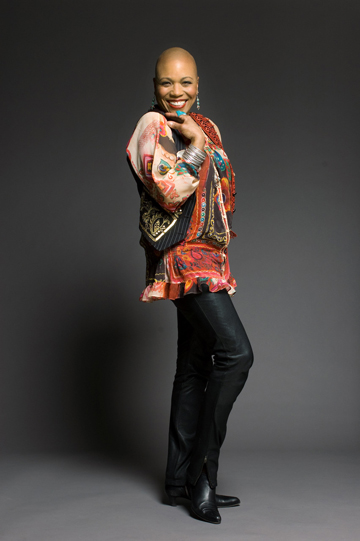
Dee Dee Bridgewater (Photo Mark Higashino).
When most children were having anxiety about what middle school would be like, Joey Alexander was performing as part of Jazz at Lincoln Center. Of course, when you’re a jazz pianist and Wynton Marsalis invites you to join him for the Lincoln Center Gala, you go, regardless of your age. That’s what Alexander did on his summer vacation. He was 10 years old.
On Friday, Jan. 12, Knight Concert Hall played home to headliner Dee Dee Bridgewater and Balinese jazz pianist Joey Alexander, as part of the 10th anniversary season of the Jazz Roots concert series and educational program.
Grammy® & Tony Award-winning singer Bridgewater stepped in to cover for Ramsey Lewis who was scheduled to play but had to cancel, recuperating from last minute minor surgery. She was joined by Alexander, the youngest Grammy® nominee in history, now at the ripe old age of 14.
The very heart of the jazz genome is forging new ground, new sound, the next generation of musical stuff. After ramping it up on his first album, “My Favorite Things,” arranged and recorded when Alexander was 11, and for which he received a Grammy® nom, there is a resulting sense of a 40-year-old piano style deep within his adolescent bones. Rendering tunes from the jazz masters including Thelonious Monk, John Coltrane and Billy Strayhorn, Alexander is now offering up original compositions to his audiences.
The thin young man with long arms, dressed in black jeans, a maroon shirt and sneakers, often stood up at the keyboard while playing an exciting passage, and constantly exchanged smiles and glances with bandmates Kris Funn on the acoustic bass and drummer Eric Harland.
The threesome acquitted their assignments well, especially on Alexander’s original tune, “Space,” Alexander adeptly threading the theme through the trio’s needle, his timing and chordal harmonies sophisticated in their simplicity. Progressively, Alexander pivoted into a heated conversation with Harland.
Harland, often seeming to have six arms and hands, tore it up on Alexander’s “City Limits,” and later, on Coltrane’s "Moment's Notice," demonstrated dynamics not often heard out of a set of traps. First soloing mightily and then, in a trance-like state, he segued into an almost imperceptible percussive riff, ending it up by playing the air with his sticks — the audience loving it.
Alexander traversed Monk’s jazz standard, “’Round Midnight,” a song he has favored throughout his burgeoning career,his slow steady phrasing a study in reverence. Funn took a solo, pulling the richness out of his bass with remarkable tone and satisfying double stops (two separate strings plucked simultaneously),the trio finishing up with a blossoming flourish.
Alexander opened his “Sunday Waltz,” the most melodic composition of the set, with a sweet reflective reverie. Funn took a center solo with the agreeable motif, burbling with a few satisfying groans of his own as the trio stirred it up at its conclusion, creating a most pleasant Sunday afternoon on this Friday night.
Older in years than Alexander, Funn and Harland often looked at the young musician with admiration, the trio constantly communicating well and obviously happy to be playing together.
Alexander has created compositions imbued with diversity. At the same time, he has distinguished himself with an impressive display of phrasing, harmonics and an understanding of the music. All this with the confidence of a child who is not yet old enough to fear much of anything. Perhaps this is the result of having performed for presidents Bill Clinton and Barack Obama.
“The show must go on.”
So, the headliner is dealing with a virus and her band is held up in Memphis, and she is due to perform that evening in Miami. What to do? Call pianist Shelly Berg, Frost School of Music Dean at the University of Miami, recruit bassist Chuck Bergeron, Frost Faculty member, and snag drummer Eric Harland from the warm-up set with Alexander. And kick the tires, light the fires! Oh yeah, and drink lots of fluids.

Joey Alexander
Dee Dee Bridgewater did just that – she swung for the fences and gave the Miami crowd a show. Her energetic stage presence engaged the audience in front of her and her eleventh-hour band was behind her all the way.
Singer-songwriter, actress and host, Bridgewater has spanned the decades, performing since she was 16. She won a Tony Award playing Glinda, the Good Witch of the South in the Broadway musical “The Wiz,” earned praise playing Billie Holiday in “Lady Day,” spent 23 years as host of National Public Radio's syndicated radio show JazzSet with Dee Dee Bridgewater, has been a three-time Grammy® Award-winning vocalist, and 2017 NEA Jazz Master honoree.
First influenced by her father who was a jazz trumpeter, then marrying another jazz trumpeter, Cecil Bridgewater, and having performed with the likes of Horace Silver, Sonny Rollins, Dizzy Gillespie, Dexter Gordon and Max Roach, Bridgewater has Jazz running through her veins.
Originally scheduled to sing songs from her most recent album "Memphis...Yes, I'm Ready", she had to quickly shift gears and turned to the Ella Fitzgerald song book, to which she is no stranger, having won a Grammy® for her 1997 tribute album “Dear Ella.”
Wearing a silver sequin cocktail dress with large tinted rhinestone-studded glasses, the animated Bridgewater opened up with “How High the Moon,” her considerable voice quickly on display as she flexed and expanded her vocals. Working her way through Fitzgerald’s song book with “Airmail Special,” “Slow Boat to China” and a very upbeat "The Surrey with the Fringe on Top," Bridgewater scatted beautifully, her high voice seamlessly sliding downtown and back up again, her command of rhythm infectious as Berg, his left foot flipping back and forth in syncopation, followed Bridgewater’s lead perfectly.
Grabbing a stool, Bridgewater took a breather, relying on her substantive lower voice leaping skywards to deliver “Stairway to the Stars,” cupping her hands to her mouth to effectively play a muted “air trombone.”
The band took off on “Basin Street Blues,” Berg wild on the keys, Bergeron plucking with abandon on his bass and Harland on parade again with a center cut drum solo, as Bridgewater leaned on the piano, admiring the band as they cooked.
Dell Smith, Bridgewater’s musical director, joined her for a duet, Smith channeling Louie Armstrong as he crooned"What a Wonderful World," their voices blending sweetly.
Bridgewater's spontaneous passion, creativity and lively personality never flagged as she and the band ripped through jazz standards “Mack the Knife,” “Cherokee” and Ellington’s “Cottontail,” Bridgewater scatting non-stop through the latter, facing off with each player, leaning into Berg, his left foot and both hands moving so quickly they appeared invisible, staring straight at Harland as he went off on a percussive romp, and engaging in a one-on-one scatting duet with Bergeron, his fingers flying as he worked the entire range of his bass.
It is said that Ella “sang the dictionary,” and Bridgewater, with a little help from her friends, sang Ella.
 MAIN MENU
MAIN MENU

